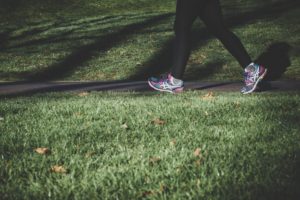
We know that exercise is good for us but when living with chronic illness, that can easily end up on the bottom of the list. I know for myself, when I was still living with multiple sclerosis symptoms, there was just so much to juggle, not to mention intense fatigue, that I just could not find a way to add to everything on my plate with a regular exercise routine. The phrase “use it or lose it” took on a whole new meaning though when I woke up one day in college not being able to walk or see. None of the things on my “to do list” mattered and I wished I had prioritized my body more leading up to that attack.
Suddenly physical activity was all I cared about. Thankfully, I quickly connected with Eric Small, founder of the Eric Small Adaptive Yoga Program, and despite blurry vision and only slowly beginning to walk again, I started adaptive yoga three times a week. For the first two weeks, he had me sitting in a specific position for the entire two hour session. Just sitting. It worked! My body started to re-balance and in a fairly quick turnaround, I was doing all the yoga positions without assistance. Today, I do my best to make exercise a priority. I’m not perfect, I can admit that things get in the way. But, I’m sure I’m not alone when I say that my body has proven to me what happens when I ignore one of its most basic needs. A project deadline, your boss’ incessant text messages, finding the perfect dress for the event, or even your child’s birthday party should not take priority over your exercise regimen.
You might be thinking “I can hardly move” or “I am so fatigued, how on earth can I exercise?!” Exercise often looks different for people living with a diagnosis, especially if there is limited ability or mobility. There is an entire world dedicated to adaptive exercise and in today’s world, there is no shortage of workout options from the convenience of your own home.
The toughest part about having an exercise routine is starting. It truly does not matter how many times you’ve tried and stopped, all that matters is that you start. Below are some of the benefits of exercise to help motivate you to get started.
Psychological benefits of exercise:
- Improves sleep (which we all need!)
- Reduces depression and anxiety (even with just 15 min/day!)
- Relieves stress
- Improves memory and cognitive function
- Positively impacts mood
- Improve your relationship with your body by focusing on the movement and experience
Physiological benefits of exercise:
- Maintains heart health
- Maintains lung health
- Reduces hypertension (high blood pressure)
- Reduces body fat
- Maintains or builds muscle mass
- Creates new synaptic connections in the nervous system (builds more neurons)
The last two benefits may actually be the most important for anyone living with chronic illness, especially those with autoimmune or neurological diseases. When disease is a result of problems with neural connections (communication between nerves and nerve cells), the body can actually compensate for that through creating new neurons. Exercise is a way for each of us to contribute to that process and help our bodies better manage disease. When it comes to muscle mass, like I said in the beginning, use it or lose it. If the muscle mass in my legs had been at a strength level 7 when that attack hit, maybe it would’ve taken me to a 4. But given that I hadn’t been physically active, I was starting at a much lower baseline and so, the impact of the attack was severely detrimental and left me unable to function.
These are only some of the benefits of exercise and I hope it’s enough to motivate you to start. Most importantly, start slow. If you can get a personal trainer, that is even better so that you learn proper technique and someone can match movements that accommodate your needs. A personal trainer will also help you progress and improve at the pace that is best for you. It’s also important to try different things and to not assume that the first thing you try will be a winner or that it will even feel good. You don’t need to aim to become a marathon runner. And there’s no need to compare yourself to friends, which I would say to anyone, not just someone with a diagnosis. Comparison is the quickest way to quit or hurt yourself. Focus on the fact that this is to enhance your relationship with your body, and help yourself long term. Just start somewhere, even if it’s just 10 minutes of stretching a day. And if it helps to tape this list of benefits to your bathroom mirror or make it your phone wallpaper, then go for it. Set yourself up for success and know that even with limited range of motion, exercise is still possible and extremely important. And, know that I’m cheering you on!